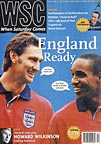 Ian Plenderleith remembers the night when it felt like Lincoln could beat anyone
Ian Plenderleith remembers the night when it felt like Lincoln could beat anyone
It wasn’t the size of the Sheffield United team that came to Sincil Bank that had the home support worried. It was the number of away fans. You could see them crossing the bridge from the coach park in the gap between the old wooden South Park and St Andrews stands. It was a never-ending stream and, for the only time in all the matches I ever saw at Lincoln, they took over the entire swath of open-top terrace that stretched alongside the ground, leaving the home fans to cram in behind the goal at the Railway End.
The gate that night was 8,550, around 5,000 more than Lincoln’s home average. What chance did we stand against a side of that stature, that could generate so many fans and take them away for a mundane midweek league game at a no-name countryside club? Surely they would sing their side to victory and drown out the home supporters, and we would traipse home humbled, but happy at the thought that at least we’d beaten Orient the previous Saturday.
So many fans, they had to be good, and who were we? Well, we happened to be top of the old Third Division, having won five of the season’s first six games. A few months earlier we had missed out on promotion by one point. Despite this, the nucleus of the best Lincoln side in 30 years remained – players like Trevor Peake, Glenn Cockerill and Gordon Hobson, who later went on to better, if not spectacular, things. At that time, with my teenage hormones only slightly affecting my judgment, I believed that if they stayed together they would eventually win the European Cup. Still, they’d have to get past Sheffield United first.
The railway terrace behind the goal was not always a comforting place to be on a dark night. For years there had been a huge sheet of corrugated iron somewhere up at the back near the roof that flapped and banged in the wind so that you felt sure it was going to crash down into the faithful. Once you’d heard it often enough, though, you became convinced that it must be safe otherwise someone would have fixed it. Its thunderclaps were as reassuring as the sound of the passing trains and the hundred-year-old version of The Lincolnshire Poacher that scratched its way through the intercom as the teams came out. Ah yes, these sounds reminded us that, despite the massed away contingent from Yorkshire, we really were at home.
The rest was up to the footballers. Lincoln came out, outplayed the men of steel and then shut up shop to preserve their energies for knocking Leicester out the League Cup a week later. Sheffield United were as paralysed as the tongues of their followers, and when Trevor Peake scored a header from a corner at the Railway End there was a cheer from the home support which combined relief, joy and astonishment all in one. Relief that we could not be touched tonight, joy at the scoreline and the continued dominance of the division, astonishment that this was all still happening to Lincoln City.
And then, better than the football, people began to sing. Sincil Bank never has and never will be a vocal ground, and its fans are hardly known as progenitors of rousing terrace originals. But tonight, with everyone cosied up behind the goal, the chant arose of “Colin Murphy’s red and white army”, sung in alternate lines on one side of the goal, then on the other. And as Lincoln played possession football the choir went on for at least 25 minutes, its anthemic strain reverberating back and forth across the railway end, even drowning out the pendulous shard of corrugated iron and somehow making that sea of people who had invaded our home terrace seem static and insignificant.
This collective celebration was nothing like I had ever experienced at Lincoln, and now that the ground has been razed and resurrected as a botch of misfit plastic-seater stands with all the soul of a Burger King, I doubt that such nights are any more commonplace than a side from one of England’s major cities coming east for a lesson in footballing basics.
At the end of the season Lincoln finished sixth, the side dispersed and four years later City were playing non-League football. But though in my lifetime we’ve never ditched a big name or forged a major cup run, that night of passion and warmth and of toying with Sheff Utd came to represent in my doting, nostalgic brain a year in which Lincoln City rose out of a century-long trough of mediocrity to play truly great football.
From WSC 154 December 1999. What was happening this month